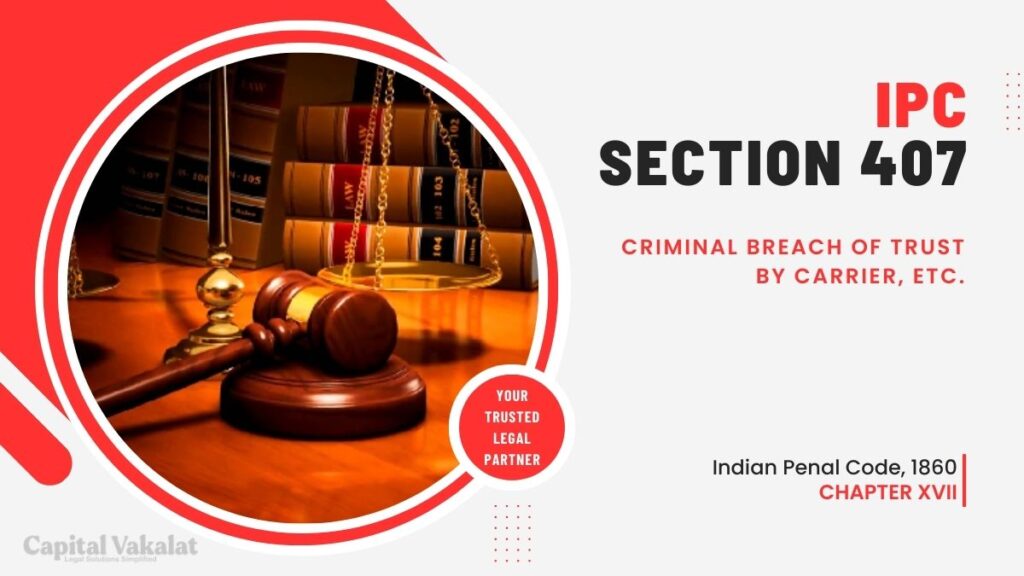Criminal breach of trust is a serious offense under Section 407 of the Indian Penal Code (IPC), specifically addressing breaches by carriers. In this article, we’ll delve into the intricacies of Section 407 IPC, exploring its definition, legal consequences, real-life examples, preventive measures, challenges in prosecution, and its impact on businesses and consumers.

Understanding Section 407 IPC is crucial in a society where reliance on carriers for transporting goods is prevalent. This section addresses situations where carriers breach the trust placed in them, leading to legal consequences.
Understanding Section 407 IPC
Definition and Scope
Section 407 IPC defines criminal breach of trust by carriers, encompassing actions that violate the trust bestowed upon them for the safe transport of goods. The section outlines the specific elements that constitute such a breach, emphasizing the importance of the relationship between the carrier and the party availing their services.
Elements of Criminal Breach of Trust by Carriers
To establish a case under Section 407 IPC, certain elements must be present. These include the existence of a fiduciary relationship, the entrustment of property, and the subsequent breach of trust by the carrier.
Legal Consequences
Violating Section 407 IPC carries significant penalties, ranging from fines to imprisonment. Judicial interpretations and landmark cases play a crucial role in shaping the consequences faced by individuals found guilty of breaching trust as carriers.
Examples of Criminal Breach of Trust by Carrier
Real-life instances provide tangible examples of the application of Section 407 IPC. By examining such cases, we gain insights into the consequences faced by carriers and the legal intricacies involved.
Preventive Measures for Carriers
Preventing criminal breach of trust requires carriers to adopt best practices, ensuring transparency and accountability in their services. This section explores measures carriers can implement to avoid legal complications.
Challenges in Prosecuting Section 407 Cases
Prosecuting cases under Section 407 IPC comes with its own set of challenges. Legal complexities and common hurdles during proceedings necessitate a careful examination of the evidence and legal arguments.
Impact on Businesses and Consumers
The repercussions of criminal breach of trust extend beyond legal consequences. This section analyzes the effects on businesses relying on carriers and suggests measures consumers can take to protect their interests.
Recent Developments in Section 407 IPC Cases
As legal landscapes evolve, so do interpretations of Section 407 IPC. This section highlights any recent changes, amendments, or updates in judicial perspectives regarding cases falling under this section.
Comparative Analysis with Similar Offenses
Contrasting Section 407 IPC with other related legal provisions offers a comprehensive understanding of the unique aspects that differentiate criminal breach of trust by carriers from similar offenses.
Conclusion
In conclusion, adherence to legal and ethical standards in carrier services is paramount. Section 407 IPC serves as a deterrent, emphasizing the importance of maintaining trust in the transport of goods.
Frequently Asked Questions
What are the maximum penalties for violating Section 407 IPC?
Penalties for criminal breach of trust by carriers may include fines and imprisonment, the severity of which depends on the circumstances of the breach and the amount involved.
How can businesses protect themselves from potential breaches of trust by carriers?
Businesses can implement thorough contractual agreements, conduct due diligence in selecting carriers, and monitor the transportation process to mitigate the risk of breaches of trust.
Are there any recent amendments to Section 407 IPC?
It’s essential to stay updated on legal developments, as amendments to Section 407 IPC or related laws may occur. Consult legal professionals or official sources for the latest information.
Can consumers take legal action against carriers for a perceived breach of trust?
Yes, consumers have legal recourse if they believe a carrier has breached trust. They can seek legal advice to understand their rights and pursue appropriate action against the erring carrier.